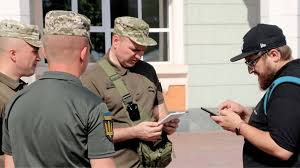I constantly strive to develop and acquire new knowledge, my experience and additional education confirm this.
Measures of influence in case of non-fulfillment of duties by a citizen during mobilization
The Law of Ukraine "On Mobilization Training and Mobilization", which regulates the procedure for mobilization measures in case of non-fulfillment of military obligations by citizens. Let's consider the main provisions of this law.
1. Administrative detention and delivery:
If a citizen has not fulfilled the requirements regarding the mobilization duty and has committed an administrative offense provided for in Article 210-1 of the Code of Ukraine on Administrative Offenses, the head of the territorial recruitment and social support center may apply to the police for the administrative detention of the citizen and his delivery to the specified center.
2. The requirement and its fulfillment:
The leader issues a written demand for military duty (mobilization task) to the citizen. The claim can be delivered personally with a receipt or sent by registered mail to the address of the person's location or residence.
3. Refusal to deliver or impossibility of fulfilling the requirement:
If the citizen refused to receive the request or delivery of the request was impossible for other reasons, this is recorded with a corresponding mark on the postal message.
4. Sanctions for failure to fulfill the requirement:
If the citizen does not comply with the requirement within 10 calendar days after delivery, the territorial center of recruitment and social support may apply to the court for a temporary restriction of the right to drive a vehicle during mobilization.
5. Fulfillment and withdrawal of the request:
The requirement is considered fulfilled if the citizen has fulfilled the obligations specified in the requirement. The requirement can be revoked in the event of the end of the mobilization period.
This rule of law demonstrates a serious approach to ensuring the fulfillment of military duties by citizens during mobilization, including measures to influence those who do not fulfill these duties.
The assistance of a lawyer in case of a request is important for the protection of the rights and legitimate interests of the citizen in the relevant legal procedures related to the mobilization measures.
Here are the key aspects that a lawyer can provide:
1. Legal analysis of the situation. The lawyer will conduct a detailed analysis on whether there is an obligation to fulfill the request received by the citizen. He will assess its legality and possible alternative courses of action.
2. Preparation of response and defense. A lawyer can help prepare a written response to the request. It is important to correctly formulate a position and arguments that can be used to protect a citizen's rights.
3. Representation in court. In the event that a claim under the law may lead to legal proceedings (for example, on a temporary restriction of the right to drive a vehicle), a lawyer can provide representation in court and protect the interests of a citizen.
4. Consultations and informational support. A legal consultant can explain all aspects of the legal situation, clarify the rights and obligations of the citizen, as well as the procedures that apply in the case of mobilization measures.
5. Appellate activity: If necessary, a lawyer can provide services in the appeal process, if the decision of administrative or judicial bodies is contrary to the interests of the citizen. The assistance of a lawyer in such situations is important to ensure compliance with legal rights and resolve legal issues arising in the context of mobilization measures.
































